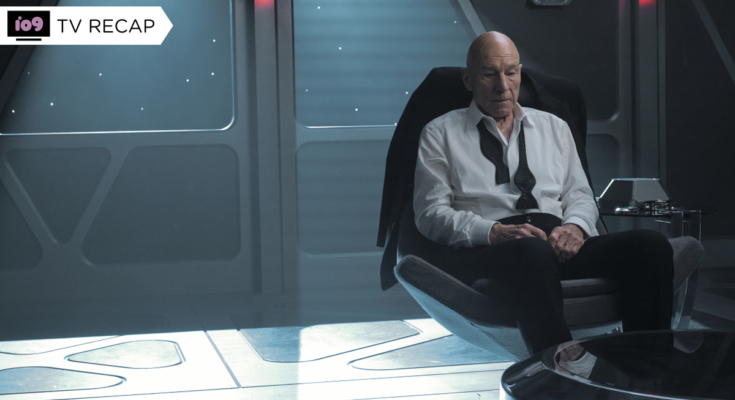
The past few episodes of Star Trek: Picard have been a bit chaotic, but in a largely fun way—a little dash of the absurd to make the strange ideas it was hastily setting up in the background go down smoothly, so you could have a bit of a chuckle when that setup came crashing down in similarly absurd fashion. This week, however, got into a much messier kind of chaos.

“Monsters” picks up, literally and proverbially, inside Jean-Luc’s head, after his dance with the vehicular devil in the pale moonlight last week saw him go into a Character Mandated Trauma Process Coma (tm, etc.). As Tallinn prepares to take a deep dive into Picard’s brain—sadly not even in a fun “Spock’s Brain” kind of way—it turns out that Jean-Luc’s quite good at doing that himself, conjuring up a faux, weirdly aggressive Starfleet therapist (Battlestar Galactica’s James Callis!) to have a very disastrous session with.
It’s here where things rapidly get messy. There’s a metaphor within a metaphor as the Starfleet therapy session dissolves into a fantasized memory world of Chateau Picard conjured by Picard at the behest of his therapist—with the child Jean-Luc and his mother extrapolated into a young prince and queen, escaping a shadowy monster—that we keep swapping between. On top of that, Callis’ therapist becomes a brief window for Picard to revert back to the type it tried in season one of the show: an interrogation of Picard’s image as this idealized leader of men, this Starfleet legend.

Here’s the thing though. Picard season one had an entire season of television to do that, and it still half-assed it to the point of giving up by the end, wholeheartedly embracing that idealized version of its title character. And not that there’s anything wrong with that, either—so far season two has largely been stronger because it just went with that flow, and took its big damn hero off on a big damn adventure. “Monsters” gives itself about half an hour to do a condensed version of all that critique, which largely boils down to Callis’ therapist poking at Picard that he likes to push people away from him, that he’s an uncaring leader, or that he’s brought into his own hype, only for Picard to in turn yell “NUH UH!!!” back. And, much like season one, it doesn’t go anywhere as we meander between the two vision worlds inside Picard’s mind, a mixed metaphor that only gets more mixed when Tallinn gets involved, tasking herself with guiding the younger Picard through processing his trauma and hopefully waking up OK on the other side.
In the end, that’s what he does, and that brief critique of his persona is largely left behind along the way, buried under one thing we already know, alluded to earlier on in the season—Picard is upset at the treatment of his mother by his father—and one thing that we didn’t: that his father (who turns out was indeed Callis’ character, the therapist a stand-in for Jean-Luc’s image of his father as an interrogative, standoffish figure) was struggling to protect his son and his wife from her traumatic mental health issues. And… that’s it? There’s a tiny little moment where Tallinn tells young Picard that one day he’ll use this trauma to help others, but that’s all you get. Picard wakes up the second this information is revealed, and promptly dusts himself off to get on with hunting down Q, deciding he’s spent quite enough time exploring his own interiority—once again, about 30 minutes of TV—and now it’s the turn of the most mysterious man in the Continuum to do so.

It feels very wasted, even if if the set up for a potentially surprisingly emotional “offensive,” as Jean-Luc puts it to Tallinn, is itself interesting. Especially so, considering that the other 15 minutes of “Monsters” after this are largely dedicated to once again splintering team Picard up into disparate groups. With Renée seemingly fine in quarantine—but with the threat of Soong and Q always present—Picard goes off to try and draw the omnipotent being out of hiding by teaming back up with young Guinan (the returning Ito Aghayere). Only, oh no, she’s being raided (?) by the FBI (??) because they have footage of Picard beaming down outside her bar the other day (???) and somehow knew he’d be there (????)!
Only, oh no-er! Seven and Agnes go back to La Sirena and find footage of a Borg-Queen-possessed Jurati assimilating the ship’s security systems, and then spend a few minutes looking at separate security footage outside a bar in LA of her smashing a window, which Seven surmises is the Queen releasing more endorphins to get even more control out of Jurati! Only, oh no-est! Rios is getting even flirtier with Dr. Teresa and, in the space of about 30 seconds to help stabilize Picard during his coma, he decides to reveal that he’s not of her timeline, promptly ignoring all the warnings about doing so by just beaming Teresa and her kid back to the ship!

Okay maybe “the Borg Queen is trying to start a new empire in 2024 LA” was higher on the oh no list than that one, but it was still very silly, and it’s all the setup we get for these larger arcs that have to be resolved in the next three episodes, because so much of “Monsters” was wasted meandering around a half-hearted “deep” dive into Picard’s psyche to ready us for his Q confrontation. If the past few weeks of Picard were the good kind of chaos that kept you on your toes wondering what was going to happen next, “Monsters” was the inverse—and without the breathing room it previously had as the remaining episode count dwindles, the show doesn’t have nearly as much time as it needs to deal with all its myriad plot threads again. Hopefully with this half-hearted self-reflection out of the way, it can regain a bit of the focus its first half had going forward into the endgame… and a bit of that chaotic fun while it’s at it, too.
Wondering where our RSS feed went? You can pick the new up one here.



